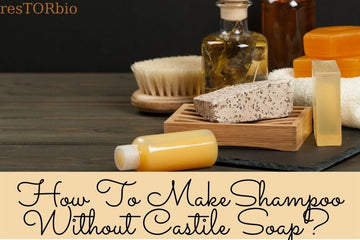
Castile soap is a popular choice for shampoo, but it can be expensive. Many people have switched to using sulfate-free shampoos, but those require you to use costly conditioners and a lot of rinsing.
If you're looking for: how to make shampoo without castile soap? there are a few different methods you can try. The easiest way to make shampoo is by using a combination of natural and artificial ingredients. Let's explore now.
The Problem Of DIY Shampoos
We all used to buy our soaps and shampoos from the store when we were young. Slowly but surely, people began to learn how to make their shampoos and soaps because they became more aware of the chemicals applied to our hair.
Soon after, DIY shampoo (or soap) recipes were viral. There are thousands upon thousands of different recipes online that use ingredients that you wouldn't usually find in shampoos.

Many people have created a slew of homemade recipes to make your hair look better. Many people claim that they don't use preservatives. However, your natural shampoo can become rancid or moldy in a short time if you do.
As you can see, those without experience shared their shampoo recipe with millions of people but didn't think about the basics of what a shampoo should do.
Are you looking for the best shampoo and conditioner for your hair, take a look at our article to find the one suitable.
What Is Castile Soap?
This miracle hair care product originated in the Mediterranean region, named after the olive oil-based soaps from the Castile region of Spain. It traveled to Europe (England) in the mid-1500s. It is a great soap that can be used in many different ways.
It is free of synthetic ingredients and animal fats. Furthermore, it is biodegradable. They can be purchased in liquid and bar forms at almost all stores. They are often made with olive oil, but they can also be made with castor or hemp oils.

Rarely can they also be made with avocado oil or walnut? It is versatile because it can be used for many purposes, including:
- Deodorant
- Dish soap
- Face wash
- Shaving
- All-purpose household cleaner
- Wound cleaning
- Shampoo
- Dishwasher detergent
- Window cleaner
This list could go on, but I believe I have made my point.
Why Would Anyone Want A Shampoo That Doesn't Contain Castile Soap?
Castile soap is an excellent base for essential oils, but not for everyone. It is not for everyone.
Your hair will need to adjust to any natural shampoo. Castile oil shampoo is no different. Some people may experience it differently. Others would find their hair covered in a thick residue that makes it difficult to touch and a hairbrush that looks disgusting after every use.

Most likely, you will read online that your hair doesn't take long to adjust to the new shampoo. This is when your hair becomes greasy or oily. If you're one of those people, you won't want to wear your hair this way for more than a few days.
You can counteract this by using an apple cider vinegar-based conditioner rinse. However, it will still leave behind a lingering scent.
Castile soap has a pH level of 10-11. Your scalp's natural pH is closer to 5. This can lead to itching and flaking.
What Can I Substitute For Castile Soap?
Castile soap can be used as a base for shampoos, so you'll need to replace it. Your preference will play a significant role here, so you may want to modify this to something that you prefer. Use an all-vegan, vegan, and gluten-free, organic shampoo base.
I prefer to go vegan for almost all products I use at home. But this is still my personal preference. You can make your soap base quickly by doing a quick internet search. There are many recipes.
Homemade Shampoo Recipes Without Castile Soap
Baking Soda, Apple Cider Vinegar
Baking soda and vinegar are the best ways to wash your hair without using commercial shampoos. Mix a tablespoon of baking soda and enough water to form a paste. Apply the paste to your scalp and gently scrub your scalp with your fingers.
Rinse off the paste—mix two tablespoons of apple cider vinegar and 2 cups of filtered tap water. Rinse your hair with this mixture. Lemon juice can be used in place of apple cider vinegar.
Coconut milk and Aloe Vera
Kalpa vriksha is the name of coconut in Sanskrit. It is the tree that provides all that is needed or is living. Coconut milk is made from the meat of the drupe and water. Aloe vera gel locks in moisture and adds shine.
Coconut milk can be used if you wish, but it is easy to make your own. Start by heating 1 1/2 cups of filtered water or distilled water until it reaches just below boiling. 2 1/2 ounces unsweetened coconut flakes are added. You can grate your coconut flakes, but also use pre-made flakes.
Let the mixture cool down before you transfer it to a food processor. Blend thoroughly. To remove the coconut milk, strain the mixture through a cheesecloth and a colander.
Equal parts coconut milk and aloe Verde gel. You can make enough to last several weeks by using 1 3/4 cups each or one can of commercial coconut milk to 1 34 cups gel.
If you wish your natural shampoo to be scented, add four or five drops of essential oils. Place the shampoo in ice-cube trays. Once the shampoo has frozen, take it out of the tray and place it in ziplock bags. One cube should be taken out of the freezer one night before you intend to use it.
After rinsing your hair, massage a quarter-sized amount of the cube into your hair. Finish with a rinse with cider vinegar.
Glycerine and Aloe Vera
Glycerine is a way to get the aloe gel into your hair more deeply and moisturize your hair. For best results, use pure aloe gel and vegetable glycerine.

Combine 1 part aloe vera gel with 1 part vegetable oil and 2 parts water. Mix well. Spray your hair with the mixture. Apply the mixture to your hair and scalp. Rinse it off. Lightly spray the mixture on your freshly cleaned hair to make a leave-in conditioner.
Natural Honey Shampoo
Honey is an antibacterial and antifungal natural, which helps to keep your hair and scalp healthy. Honey has a pH level identical to your hair's, so it won't strip your hair of the essential oil that makes your hair shine. You will need to use raw honey and filtered waters, as well as any essential oils, to make this shampoo.
This shampoo should be used as soon as you use it. Honey can quickly develop mold if it is exposed to water. Combine 1 tablespoon of honey with 3 tablespoons of filtered water or distilled water and 2 to 4 drops of essential oils.
My Tips
These homemade shampoos should be used immediately for best results. However, if you wish to keep it in your refrigerator for more extended periods, store it in the fridge for at least 3 days. Do not use it if it smells funny.
You can also add any essential oils you like to your shampoo. You can use tea tree oil to reduce dandruff, rosemary to stimulate hair growth, and lavender to create a beautiful scent.

Do you still need a conditioner after using these homemade shampoos without castile soap? No, you don't! You won't have any problems detangling your hair with these ingredients, which include egg, honey, and coconut oil, as well as olive oil and essential oils.
My hair feels silky soft after using homemade shampoos. I can detangle my hair in five minutes or less with my fingers.
FAQs
Can I Substitute Castile Soap For Dawn?
Castile soap can be used to wash dishes. It is possible. This hair care product can leave soap scum if you live in an area with hard water. You may prefer to use Dr. Bronner's Sal Suds if you are a fan like me.
What's The Purpose of Castile Soap?
These essential oils are responsible for the soap's lathering, moisturizing and cleansing properties. It is a great product. It's eco-friendly, but it can also be used for specific purposes. The product can be used on your skin, at your home, or even on pets.

What's The Difference Between Castile Soap Versus Regular Soap?
Castile soap works just like regular soap but is much more environmentally friendly. This soap is not made from animal fats like lard, butter, or tallow. It is made from vegetable oils, such as olive oil. This soap is also considered vegan. Bronner soaps have the best of both: high lather and soft skin.
Video
Conclusion
An excellent homemade shampoo can be made with a few simple ingredients. As you already know, it is an excellent idea to avoid sugary shampoos. However, you can use a mild conditioner and baking soda as an ideal shampoo for your hair. Be aware of your hair type and the ingredients you are using.
A shampoo that doesn't have proper emulsification may cause unwanted buildup and increase the chance of hair fall. So, resTORbio hopes that you find the answer you need.




